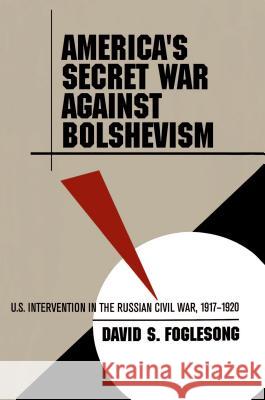America's Secret War Against Bolshevism: U.S. Intervention in the Russian Civil War, 1917-1920 » książka
America's Secret War Against Bolshevism: U.S. Intervention in the Russian Civil War, 1917-1920
ISBN-13: 9780807849583 / Angielski / Miękka / 2001 / 400 str.
America's Secret War Against Bolshevism: U.S. Intervention in the Russian Civil War, 1917-1920
ISBN-13: 9780807849583 / Angielski / Miękka / 2001 / 400 str.
(netto: 287,60 VAT: 5%)
Najniższa cena z 30 dni: 283,06 zł
ok. 13-18 dni roboczych.
Darmowa dostawa!
From the Russian revolutions of 1917 to the end of the Civil War in 1920, Woodrow Wilson's administration sought to oppose the Bolsheviks in a variety of covert ways. Drawing on previously unavailable American and Russian archival material, David Foglesong chronicles both sides of this secret war and reveals a new dimension to the first years of the U.S.-Soviet rivalry. Foglesong explores the evolution of Wilson's ambivalent attitudes toward socialism and revolution before 1917 and analyzes the social and cultural origins of American anti-Bolshevism. Constrained by his espousal of the principle of self-determination, by idealistic public sentiment, and by congressional restrictions, Wilson had to rely on secretive methods to affect the course of the Russian Civil War. The administration provided covert financial and military aid to anti-Bolshevik forces, established clandestine spy networks, concealed the purposes of limited military expeditions to northern Russia and Siberia, and delivered ostensibly humanitarian assistance to soldiers fighting to overthrow the Soviet government. In turn, the Soviets developed and secretly funded a propaganda campaign in the United States designed to mobilize public opposition to anti-Bolshevik activity, promote American-Soviet economic ties, and win diplomatic recognition from Washington.











